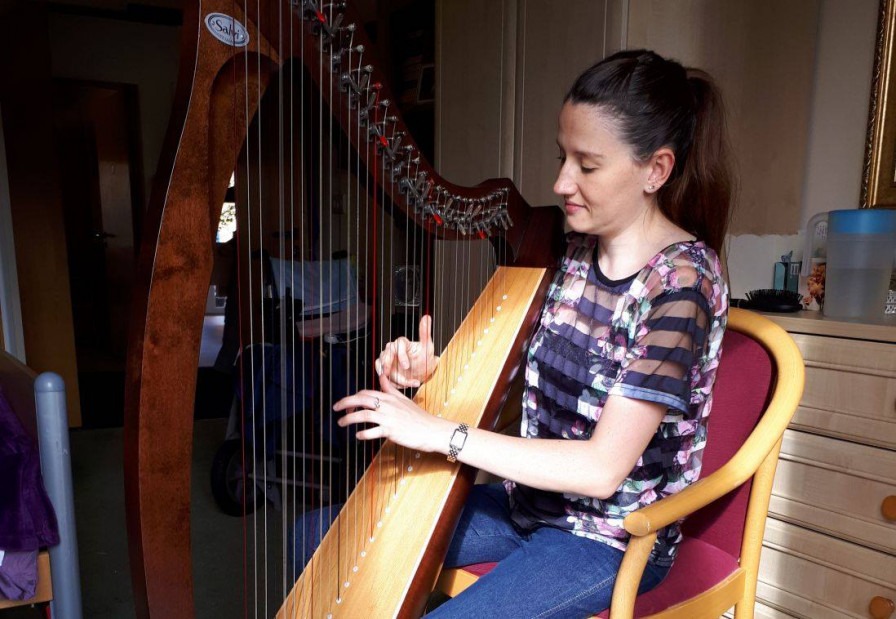Developing skills to lead music workshops in a primary special school

Live Music Now's training pathway - SEND Inspire - is helping early career professional musicians to develop their skills to deliver concerts and lead music sessions for young people with additional needs. Here, LMN harpist Elfair Grug Dyer blogs about her first training project. Further info about SEND Inspire can be found here: http://network.youthmusic.org.uk/posts/send-inspire-live-music-now%E2%80...
Elfair Grug Dyer - some thoughts on my recent "SEND Inspire - Level 1 Project"
I am a classically trained harpist on the Live Music Now scheme. My work as a freelance harpist has taken me down many exciting paths, but my work for LMN is one of the most rewarding for me as a musician, as you can see the positive benefit that music can bring to peoples lives.
I feel lucky that the harp is a great tool for interaction. Harpists can talk and sing whilst playing, as well as providing a constant flow of music going through a session. The harp can accompany songs as a percussion instrument, or with chords, as well as playing the melody. It’s also an instrument that all children can play in some way, play a glissando, tap it as a drum, or pluck a string. Also, as a large instrument, more than one pupil can play at the same time (although challenging!) and can also be used as a central focus for a class sitting in a circle.
My initial LMN training gave me confidence to deliver participatory concerts for audiences varying in size and age. This has included performing in several special schools and witnessing striking responses from pupils. After these concerts I wondered, “What would I do next time if I would have to come back?” and “What would I do if I had to work with the children in a classroom setting rather than a participatory concert?”
So, I was delighted to be able to take on a Level 1 SEND Inspire project (3 day residency in a primary special school) to develop my skills further to work with young people with additional needs. The training involved an afternoon planning meeting at the host school along with another LMN musician and our mentor, Bea Hubble, followed by 3 days working with five classes, with time to reflect built in to the schedule.
Bea, our mentor, led the first two days. It was great to learn from her how she reads the room and makes decisions reflecting this. Bea helped us think about how we could develop ideas we already had, and also advised how songs/activities could be adapted to suit the children’s needs. On the third day we led the sessions ourselves, spending time afterwards to evaluate our work and reflect on the pupils’ responses by looking at the videos from the sessions.
The project certainly gave me a good understanding of how I can engage with young people with special educational needs and disabilities. Some of the main things I learnt were:
How to keep a session flowing. This was quite challenging, but we learnt how to approach this using techniques such as:
- how to share out musical instruments and collect them, making it part of the musical experience
- how to link different musical activities without breaking the session too much and losing receptiveness of the class
- giving individuals a chance to perform/join in musically whilst also involving everyone as a class
- singing as a group and repeating same chords/tune throughout a session for comfort
Being able to change plans mid-session: even if you have plans for the session, the reality was that you might have to change them significantly because of the pupil’s engagement and responses. I was reminded to be ready for anything and learnt that you need a range of ideas in mind to draw on and be ready to adapt your material to suit pupils’ needs. I also gained confidence in discussing and planning with staff and involving them in the session.
It takes time for some pupils to feel comfortable enough to participate: even though we only had two sessions with most of the classes, I was struck by how many of the pupils were more engaged second time round and comfortable enough to create music. We certainly witnessed a progression across the two sessions and it would be very interesting to see the development over many more sessions.
Use of repetition is important: simple activities worked better to allow space for repetition and development over the session.
The residency was a valuable opportunity to develop my musical ‘activity toolkit’ and to gain confidence in changing plans mid-session and adapting to try activities ‘on the spot’. The positive responses we received from the pupils and staff made the training a little less overwhelming than I first imagined, but it was extremely eye-opening to the acute level of awareness that you must have to lead sessions such as this.
I am looking forward to the next challenges of SEND Inspire Level 2 with the opportunity to leading a short residency myself using the skills I learnt during this project.
